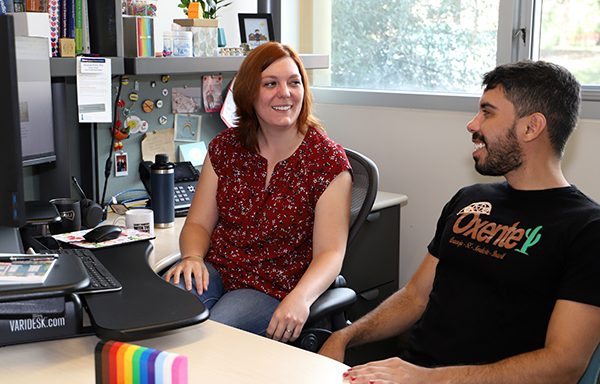Pollitt receives NIH R03 award for research on bisexual young adults

Shortly after arriving at Northern Arizona University’s Center for Health Equity Research (CHER) a year ago, Amanda Pollitt applied to fund her “dream project” through the National Institutes of Health (NIH) on relationship quality and health among bisexual young adults.
Her aspiration became a reality when the assistant professor in the Department of Health Sciences and the CHER received an NIH R03 Small Grant Program award for her project, “Health Behaviors and Relationships among Bisexual Young Adults.”
Pollitt’s work with co-investigator Casey Totenhagen, associate professor in the Department of Human Development and Family Studies at the University of Alabama, will identify the influence of sexual minority stigma and relationship dynamics on health behaviors among bisexual young adults in same- and different-sex relationships.
Through their project, the researchers hope to collect the first longitudinal dataset on stigma, relationships, and health behaviors—such as eating, exercise and sleep patterns—among this sexual minority group.
Their results could be used for programs, practices, and policies aimed at improving relationships and eliminating health disparities—such as a lack of access to mental health care—among bisexual populations.
“As a pre-tenure professor, receiving funding for this project allows me to collect data and conduct research that I otherwise wouldn’t be able to do,” Pollitt said. “It also shows that NIH understands that research on bisexual populations should be a priority.”
Pollitt is an early career investigator, but she has already successfully conducted research on longitudinal relationship dynamics and health in same and different-sex married couples.
She received her doctorate in family and consumer sciences with an emphasis on family studies and human development at the University of Arizona. She has experience in demography and population health through her work as a postdoctoral fellow at the Population Research Center at the University of Texas at Austin.
Totenhagen’s research examines relational quality in romantic relationships––such as gay and lesbian, dating, married, and cohabiting couples—with an emphasis on how daily experiences impact relationship quality. She has written numerous papers on relationship quality using longitudinal multilevel modeling, including with samples of both different- and same-sex couples.
Bisexual youth adults and healthy relationships
According to the researchers, bisexual young adults report worse health behaviors than both heterosexual and lesbian or gay young adults due to experiences of pervasive stigma-based sexual minority stress.
Pollitt said that romantic relationships can be difficult for bisexual young adults whose sexual identity is defined by the ability to enter into same- or different-sex relationships.
“We know so little [about bisexual health], so we’re just building that foundation of research on bisexuality,” Pollitt said about examining romantic relationship dynamics and the association between stigma and health behaviors among bisexual young adults.
Their project will:
- Determine how sexual minority stigma relates to health behavior.
- Identify positive and negative relationship dynamics that contribute to stigma or unhealthy behaviors.
- Examine how stigma, relationship dynamics, and health behaviors differ for bisexual young adults in same- and different-sex relationships.
The researchers will collect baseline and 14 days of daily diary data from 1,000 young adults (250 bisexual women in a same-sex relationship, 250 bisexual men in a same-sex relationship, 250 bisexual women in a different-sex relationship, and 250 bisexual men in a different-sex relationship) between the ages of 18-26 who have been with their romantic partner for at least four months.
“We are trying to capture the behaviors or the antecedent to things like chronic diseases, depressive symptoms, alcohol use, exercise—those day-to-day behaviors that over time contribute to poor health,” Pollitt said.
Research supported by Eunice Kennedy Shriver National Institute of Child Health & Human Development under award number R03HD108527.